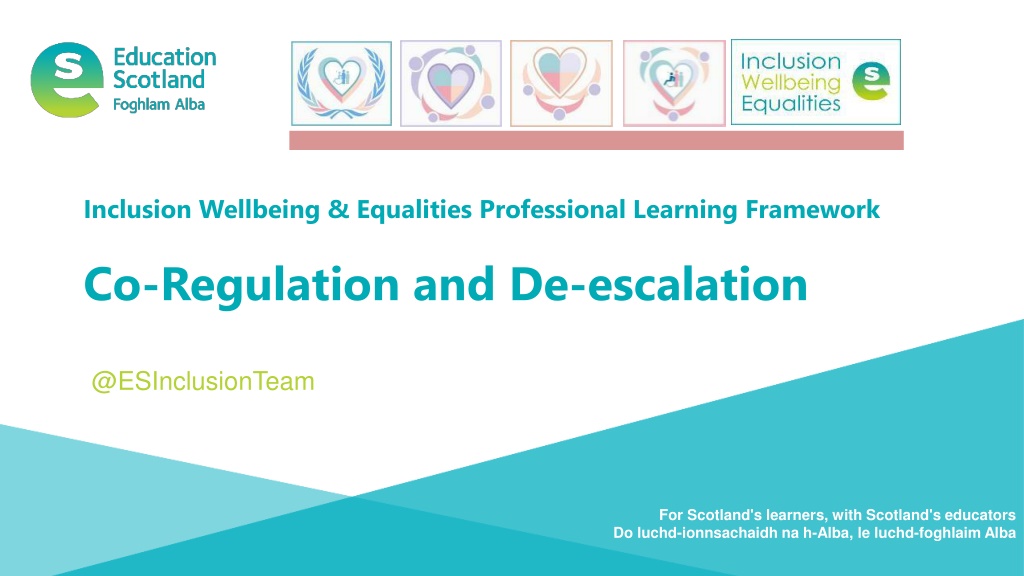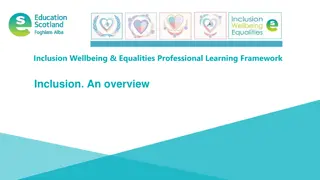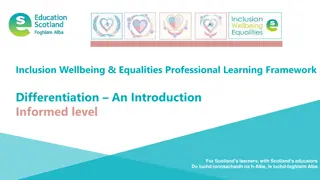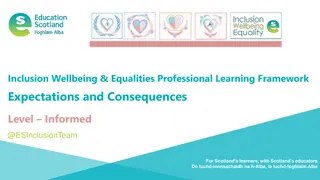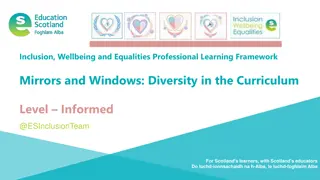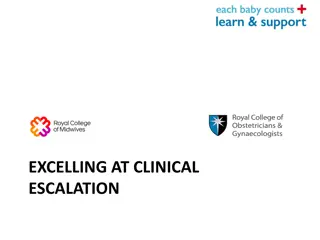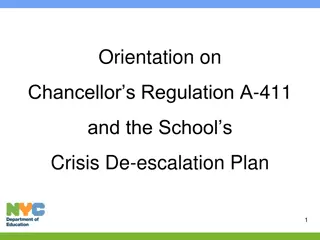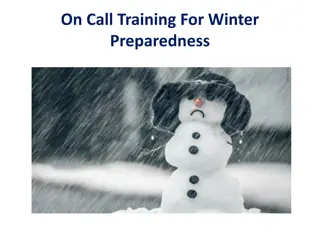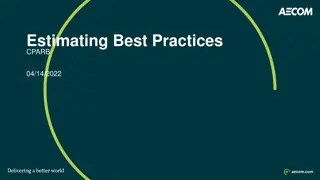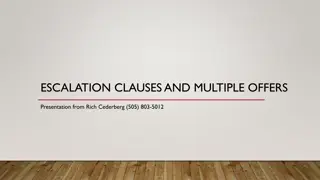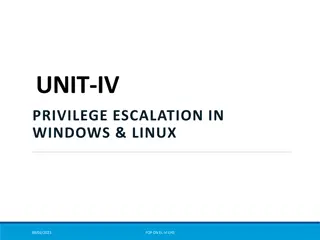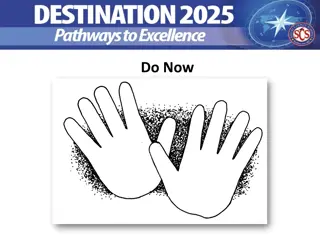Scotland's Professional Learning Framework: Co-Regulation and De-escalation
This professional learning framework focuses on co-regulation and de-escalation strategies for Scotland's educators to enhance the well-being and inclusion of Scotland's learners. It includes resources for facilitating group or self-directed learning activities, emphasizing the importance of creating a safe and respectful space for reflection and discussion. The framework aims to deepen knowledge and understanding, empowering participants to apply learning in educational settings effectively.
Download Presentation

Please find below an Image/Link to download the presentation.
The content on the website is provided AS IS for your information and personal use only. It may not be sold, licensed, or shared on other websites without obtaining consent from the author. Download presentation by click this link. If you encounter any issues during the download, it is possible that the publisher has removed the file from their server.
E N D
Presentation Transcript
Inclusion Wellbeing & Equalities Professional Learning Framework Co-Regulation and De-escalation Informed Level @ESInclusionTeam For Scotland's learners, with Scotland's educators Do luchd-ionnsachaidh na h-Alba, le luchd-foghlaim Alba For Scotland's learners, with Scotland's educators Do luchd-ionnsachaidh na h-Alba, le luchd-foghlaimAlba
Interconnectivity For Scotland's learners, with Scotland's educators Do luchd-ionnsachaidh na h-Alba, le luchd-foghlaim Alba
How to use this resource These slides can be used to facilitate professional learning in a group or whole-setting, or as a self-directed learning activity as an individual. Facilitation notes are included at the bottom of each slide. Please do not remove or change any of the slides included. Facilitators are welcome to add slides or activities relevant to your own setting, to support discussion and exploration of the topic. Facilitators will know their participants needs best. Anyone who works in an educational setting can be a facilitator and use these slides. For reflection or discussion activities, it is important to establish a safe space which encourages respect and honesty to ensure that everyone is able to participate. For Scotland's learners, with Scotland's educators Do luchd-ionnsachaidh na h-Alba, le luchd-foghlaim Alba
National Model for Professional Learning This professional learning resource will support you to deepen your knowledge and understanding. You will have the opportunity to consider how to take this learning forward on your own and with others. The National Model of Professional Learning (education.gov.scot) For Scotland's learners, with Scotland's educators Do luchd-ionnsachaidh na h-Alba, le luchd-foghlaim Alba
Welcome This session provides an opportunity to: To learn about co-regulation and de-escalation and how they are different To reflect on how we can use co-regulation to help learners develop the ability to self-regulate To explore the elements of conflict and how it can escalate To learn when and how to de-escalate conflict To reflect on a range of ways to resolve conflict For Scotland's learners, with Scotland's educators Do luchd-ionnsachaidh na h-Alba, le luchd-foghlaim Alba
How to use this resource These slides can be used to facilitate professional learning in a group or whole setting, or as a self-directed learning activity as an individual. Facilitation notes are included at the bottom of each slide Please do not remove or change any of the slides included. Facilitators are welcome to add slides or activities relevant to your own setting, to support discussion and exploration of the topic. Facilitators will know their participants needs best. Anyone who works in an educational setting can be a facilitator and use these slides. For reflection or discussion activities, it is important to establish a safe space which encourages respect and honesty to ensure that everyone is able to participate. For Scotland's learners, with Scotland's educators Do luchd-ionnsachaidh na h-Alba, le luchd-foghlaim Alba
Part 1 Co-regulation For Scotland's learners, with Scotland's educators Do luchd-ionnsachaidh na h-Alba, le luchd-foghlaim Alba
Co-regulation 5.22 min Video by Administration for Children & Families (ACF) If viewing as a PDF please click this link to watch the film https://youtu.be/RRMBHQ-Bmk0 For Scotland's learners, with Scotland's educators Do luchd-ionnsachaidh na h-Alba, le luchd-foghlaim Alba
Co-regulation is: the ability to regulate emotions and behaviours, manage stress (internal or external ), and return to a calm state, with the support and direction of a connecting person Self-regulation is: the ability to recognise, manage, and respond to our own emotions the ability to monitor and control our thoughts, feelings and behaviours the ability to use personal strategies to return to a calm state the nurturing connection of another person that supports regulation through the use of strategies, tools, and calming techniques (See self-regulation module) Co-regulation and self-regulation are part of the developmental process For Scotland's learners, with Scotland's educators Do luchd-ionnsachaidh na h-Alba, le luchd-foghlaim Alba
In other words The feelings and behaviour of someone in close proximity to another person, directly impacts how they feel, and respond to their own emotions. If when someone is dysregulated and outside their window of tolerance, someone else close to them stays calm, and models how to calm down, this can help a dysregulated person to, in turn, calm down themselves. Ideally the role of the adult is to support someone to stay within their window of tolerance however co-regulation is something to try if hey become emotionally over-whelmed and go beyond their ability cope with a situation or circumstance For Scotland's learners, with Scotland's educators Do luchd-ionnsachaidh na h-Alba, le luchd-foghlaim Alba
Development of self-regulation through co-regulation Dependence Interdependence Independence EXTERNAL (Co-regulation) INTERNAL (Self- Regulation) We look to parents or care-givers to help us co-regulate strong emotions when we are young Attunement and Active Listening are key co-regulation skills Regular co-regulation helps us develop the ability to self-regulate moving from dependence on the external support to the ability to independently self- regulate Even as adults we benefit from co-regulation from others when we become overwhelmed For Scotland's learners, with Scotland's educators Do luchd-ionnsachaidh na h-Alba, le luchd-foghlaim Alba
Arrested development of self-regulation skills If we don t receive co-regulation when we need it, our emotional development could be delayed, or arrested, and we may struggle with self-regulation even into adulthood Any trusted adult who has a healthy relationships with us, can use co-regulation techniques, at any stage of our lives, to help us learn to self-regulate. A trusted person could be a key adult in school or an educational setting However, we haven t received this type of nurturing care when we are young, we may have learned that we can t rely on adults (others) and will not automatically seek support So when support is offered we may not accept it or may even reject it This is why relationships and trust building is essential, when times are good, so that when support in the form of co-regulation is offered we feel safe enough to accept it For Scotland's learners, with Scotland's educators Do luchd-ionnsachaidh na h-Alba, le luchd-foghlaim Alba
Staff wellbeing!! Please take this caution seriously!! Co-regulation can be exhausting At times we may become dysregulated ourselves (this is normal) During these times we need colleagues to help us regulate, or we may need to take some time to self-regulate Regular honest and open conversations with colleagues about what we find difficult and what we finds helps fosters greater understanding and trust amongst colleagues It s aways helpful to proactively develop a colleague network of support either formally or informally This is particularly relevant in setting where crisis situations are more likely, and staff more regularly need to use co-regulation and de-escalation For Scotland's learners, with Scotland's educators Do luchd-ionnsachaidh na h-Alba, le luchd-foghlaim Alba
Part 2 De-escalation For Scotland's learners, with Scotland's educators Do luchd-ionnsachaidh na h-Alba, le luchd-foghlaim Alba
What is conflict? Conflict means different things to different people and there are various types of conflict Conflict is going to happen! In basic terms conflict is a disagreement or argument Conflict usually happens between people when they have different opinions on things. A conflict can happen between two or more people or between groups of people For Scotland's learners, with Scotland's educators Do luchd-ionnsachaidh na h-Alba, le luchd-foghlaim Alba
Conflict: is interpersonal - involving two or more people happens when people disagree and is a natural outcome of human interaction can be verbal or non-verbal can be mild or severe happens because people have different - personalities, values, expectations, attitudes, opinions, or goals isn t always serious nor negative Learning how to recognise and work through interpersonal conflict in productive, healthy ways is an important skill that can help us have better relationships in life For Scotland's learners, with Scotland's educators Do luchd-ionnsachaidh na h-Alba, le luchd-foghlaim Alba
Types of Conflict misunderstandings or differences of opinion disagreement over information or the truth of something different personal values and those involved can t respectfully disagree when those involved can t back down from an argument or accept a loss when those involved can t agree on an approach or action For Scotland's learners, with Scotland's educators Do luchd-ionnsachaidh na h-Alba, le luchd-foghlaim Alba
Conflict, stress, and anger In a situation where, one person involved in the conflict is stressed or angry, then the conflict can quickly escalate This happens because anger in one person is often met with anger, or fear, in another This is called emotional transference Emotional transference often creates a conflict cycle which, if not interrupted or broken, can escalate the severity of the conflict For Scotland's learners, with Scotland's educators Do luchd-ionnsachaidh na h-Alba, le luchd-foghlaim Alba
The Conflict Cycle in an adult-child context Components of the conflict are stress, thoughts, feelings, and behaviour 1. A young person is stressed, this triggers strong emotions which results in inappropriate or distressed behaviour 2. The young person s behaviour then triggers stress, strong feelings and a response (behaviour) from the adult 3. The adult s response can then trigger more stress in the young person and the cycle begins! From Small steps = Big Rewards North East Education Center PBIS Summit January 23, 2014 For Scotland's learners, with Scotland's educators Do luchd-ionnsachaidh na h-Alba, le luchd-foghlaim Alba
Conflicts in an educational context Where there are stressors there is the potential for conflict Adults and children both get stressed creating the conditions needed for conflict and getting into a conflict cycle For Scotland's learners, with Scotland's educators Do luchd-ionnsachaidh na h-Alba, le luchd-foghlaim Alba
Stressful triggers NB: SOURCES OF STRESS Sensory Social Physical Psychological Learning Family/community The initial stress can come from anywhere, or from an earlier incident/event, and may not be obvious (to others adult or child) Stressors can come from more than one source and can accumulate (trigger stacking) See Self-regulation Module for more detail NB: For adults this could include workload, working conditions, etc. Remember - the stressor could be negative thoughts (perhaps from shame/pain origins) For Scotland's learners, with Scotland's educators Do luchd-ionnsachaidh na h-Alba, le luchd-foghlaim Alba
To reduce risk prioritise breaking the conflict cycle The conflict may still need to be resolved however breaking the conflict cycle is the first step to de-escalating the situation and reducing risk De-escalation is reducing the intensity of a conflict (or potentially violent situation) De-escalation may also involve co-regulation with one or more of those involved in the conflict HOWEVER co-regulating with someone is not possible if you are one of the people caught in the conflict cycle For Scotland's learners, with Scotland's educators Do luchd-ionnsachaidh na h-Alba, le luchd-foghlaim Alba
De-escalation involves: using strategies that take the heat out of the conflict at the earliest point identifying risk and intervening in a calm and controlled manner preventing a situation from getting worse If you are not CALM it is impossible to effectively de-escalate a situation For Scotland's learners, with Scotland's educators Do luchd-ionnsachaidh na h-Alba, le luchd-foghlaim Alba
For Scotland's learners, with Scotland's educators Do luchd-ionnsachaidh na h-Alba, le luchd-foghlaim Alba
Research-based approaches to de-escalate conflict The Basics: stay calm and if possible, nip things in the bud Being aware of your body language (non-threatening, culturally sensitive,..) Using attunement (see separate module) Actively listening and using non-verbal communication (see separate module) Being Curious not Furious Using a no blame approach and offering positive choices (and being solution focussed) See the other modules for details about some of these approaches. The following slides gives some tips about things to try however the list is not exhaustive and always remember some things will work for some people and some will not. It comes to knowing the people (children and adults) you work with and lots of practice. For Scotland's learners, with Scotland's educators Do luchd-ionnsachaidh na h-Alba, le luchd-foghlaim Alba
Control what you can: yourself & how you respond Ask yourself: how am I feeling now? Use any strategies that work for you to maintain, or return to, your calm Take a few breaths Reframe your thoughts and use positive self-talk If necessary, and possible, give yourself some time, or some space If necessary, and possible, seek some support For Scotland's learners, with Scotland's educators Do luchd-ionnsachaidh na h-Alba, le luchd-foghlaim Alba
Control what you can: the physical & social environment Ask yourself: how is the environment affecting this person or the situation? remove any objects (or people) that may increase the risk level use your knowledge of the person to know if you need to give them physical space, or move closer, to give them comforting support if necessary, and possible, give them some time to regain their calm say very little, do not reason with them (remember RRR*) if they are ready to talk isolate the conversation (or if possible, move to a quieter area) * RRR= Regulate, Relate, Reason the sequence of engagement (see separate module) For Scotland's learners, with Scotland's educators Do luchd-ionnsachaidh na h-Alba, le luchd-foghlaim Alba
Get to know those you work with to be able to identify: Get Curious Not Furious! their early warning signs their stressors their interests/motivators ideas to distract or divert their attention effective calming activities Knowing these things will help you during de-escalation For Scotland's learners, with Scotland's educators Do luchd-ionnsachaidh na h-Alba, le luchd-foghlaim Alba
When you can talk - language is very important Language patterns, vocabulary and ways of talking can shift the emotional state of the listener (Mahoney, 2003: viii). So regardless of what we say, how we say it is vitally important. We should try to: show empathy and be attuned to the other person be as neutral as possible use non-judgemental language use solution-orientated language if problem solving is needed For Scotland's learners, with Scotland's educators Do luchd-ionnsachaidh na h-Alba, le luchd-foghlaim Alba
Remember Nurture Principle 4: Language is a Vital Means of Communication Try using PACE Acceptance Playfulness Curiosity Empathy Help me understand Let me see if I have this right I ve just realised What if I can see that I m wondering if I can see how I imagine that was It s such a big ask Big gestures Cheeky grin Varying tone of voice Laughing together Be cautious about using playfulness in a crisis as it may be perceived as not understanding the severity of the situation for the other person/child who may escalate their behaviour so that you see what they are experiencing For Scotland's learners, with Scotland's educators Do luchd-ionnsachaidh na h-Alba, le luchd-foghlaim Alba
What Happens If We Reframe Our Thinking and Language? Our internal use of language is important as it directly influences how we respond to a situation Use accurate, positive, and helpful language to help us think differently about the situation and support the person we are working with For Scotland's learners, with Scotland's educators Do luchd-ionnsachaidh na h-Alba, le luchd-foghlaim Alba
After de-escalation and the risk is reduced The reason for the conflict may still need to be resolved There are 5 key approaches to resolving conflict: Withdrawal Accommodation Competition Compromise Collaboration The approach taken will depend on a range of factors including who is involved in the conflict The following slide provides some things to consider about each approach For Scotland's learners, with Scotland's educators Do luchd-ionnsachaidh na h-Alba, le luchd-foghlaim Alba
Conflict resolution: 5 key approaches Withdrawal Accommodation Competition Compromise Collaboration Avoidance can cause problems with relationships Involves putting someone else s needs first Involves pushing for your own perspective Involves both parties giving some ground Win-win result but requires effort on everyone s part When to purposely withdraw: Intense situations Remember all relationships should involve some give and take Doesn t always mean using aggression or manipulation It s generally better to get some of what you want than none More long-term benefits than other strategies So one party should not always be accommodating Persuasion, when respectful, can lead to good outcomes Can lead on to collaborative problem-solving the conflict is unimportant However it may be less popular than quicker solutions There are plenty of healthy ways to work through conflict, though some won t work in every situation For Scotland's learners, with Scotland's educators Do luchd-ionnsachaidh na h-Alba, le luchd-foghlaim Alba
Things to remember: Find your calm you may need to pro-actively practice doing this Co-regulation may be necessary before you try to resolve a conflict (patience required) Stress, anger, or fear can easily create a conflict cycle (emotional transference) Conflict cycles can quickly escalate in intensity and increase risk If possible, break the cycle to begin de-escalation Reduce risk using some of the strategies mentioned - you may need to pro-actively practice using the strategies with different people in different situations to see what works for you and for them Consider the full range of approaches to conflict resolution For Scotland's learners, with Scotland's educators Do luchd-ionnsachaidh na h-Alba, le luchd-foghlaim Alba
Final reminder: staff wellbeing and support Co-regulation and de-escalation takes it s toll on those regularly involved in both Plan for colleague support as a regular part of practice to avoid compassion fatigue/burnout Plan staff wellbeing sessions Be non-judgemental of each other and offer compassion as well as practical support Show yourself self-compassion and practice self-care (we generally aren t good at this) If you work in a setting where co-regulation and de-escalation is more likely to be needed regularly consider setting up a system of supportive supervision For Scotland's learners, with Scotland's educators Do luchd-ionnsachaidh na h-Alba, le luchd-foghlaim Alba
Resources and Information to help For Scotland's learners, with Scotland's educators Do luchd-ionnsachaidh na h-Alba, le luchd-foghlaim Alba
Reflection From what you have learned so far, think about: How has this made you feel? What has this made you think about? What one action would you like to take forward? How can you link what you plan to do with others in your setting? How you will know that this learning has made a difference? For Scotland's learners, with Scotland's educators Do luchd-ionnsachaidh na h-Alba, le luchd-foghlaim Alba
We value your feedback From now until March 2024 we will be taking feedback on these resources so that we can make changes in advance of a formal launch of the Professional Learning Framework in June 2024 Your feedback could help us improve this resource Please complete this short form, using the link or QR code, to let us know what you thought of it and any suggestions you have on how it could be improved LINK: https://forms.office.com/e/b5PCpJJJ3P For Scotland's learners, with Scotland's educators Do luchd-ionnsachaidh na h-Alba, le luchd-foghlaim Alba
Education Scotland Denholm House Almondvale Business Park Almondvale Way Livingston EH54 6GA T +44 (0)131 244 5000 E enquiries@educationscotland.gsi.gov.uk For Scotland's learners, with Scotland's educators Do luchd-ionnsachaidh na h-Alba, le luchd-foghlaim Alba For Scotland's learners, with Scotland's educators Do luchd-ionnsachaidh na h-Alba, le luchd-foghlaim Alba
